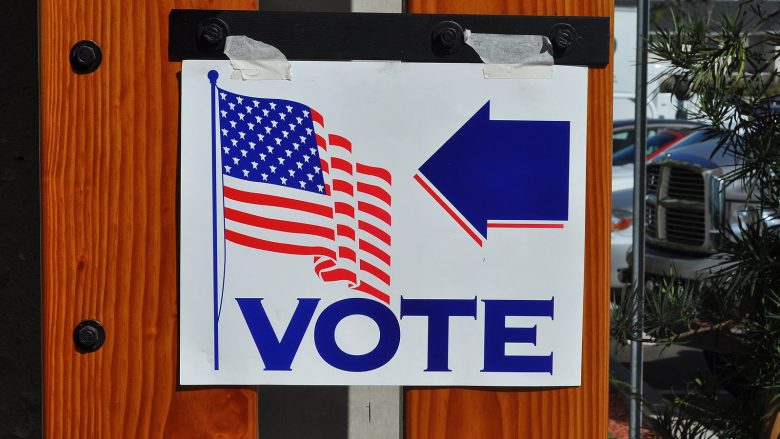Maine Senate Adopts Compact Bill Aiming To Upend Electoral College With Nationwide Popular Vote Totals In Presidential Elections
By Matt McDonald | March 14, 2024, 1:09 EDT

The Maine Senate has approved a bill seeking to have the state join a compact aimed at replacing the Electoral College with the national popular vote total for selecting the president of the United States.
The measure would increase the chances of Democrats to win the presidency, though it’s not likely to take effect this year.
The bill passed the Maine Senate on Wednesday, March 13 on an almost straight party-line vote, 23-12 – with 21 Democrats and 2 Republicans in favor; and 11 Republicans and 1 Democrat against.
On March 5, the Maine House of Representatives passed the bill, 74-67. Only Democrats and one independent voted for it. Voting Yes were 73 Democrats and 1 independent. Voting No were 61 Republicans, 5 Democrats, and 1 independent.
The compact is an end-around an amendment to the federal constitution, which is difficult to get because it requires approval by two-thirds majorities in each chamber of Congress followed by approval by three-quarters of the states.
Instead, the compact is an agreement among states to act a certain way if certain conditions are met.
“Under the compact, all of a participating state’s electoral votes are awarded to the presidential slate that receives the most popular votes in all 50 states and the District of Columbia,” states the text of the compact, which is included in the Maine bill.
The compact seeking to upend the Electoral College would not take effect until enough states enact it to total at least 270 electoral votes, which is the majority needed to elect a president.
The compact tilts Democratic because Democrats have gotten more votes than Republicans have in most presidential elections in recent decades – including in certain elections the Democrats lost.
Republicans won the presidency in 2000 and in 2016 by winning a majority of votes in the Electoral College despite losing the nationwide popular vote – in part because several of the most populated states (including California, New York, and Illinois) are heavily Democratic, while Republican-leaning large states (including Texas and Florida) are more evenly split.
During the last 50 years, Republicans have won popular vote majorities in presidential elections only in 1980, 1984, 1988, and 2004.
Under the system in place since 1788, electors in the Electoral College directly elect the president, who becomes the head of the executive branch of the federal government. Each state gets a number of electors equal to the total of its senators and representatives in Congress. States determine their electors “in such Manner as the Legislature thereof may direct,” as Article II, Section 1 of the United States Constitution states.
All 50 states have electoral votes, as does the District of Columbia (through the Twenty-Third Amendment to the federal constitution, which was ratified in 1961). Each state legislature determines how the state’s electoral votes are awarded. Currently, 48 of the 50 states award all of the state’s electoral votes to the slate of electors associated with whichever candidate gets the highest number of votes from the state’s voters in the every-four-years November presidential election. Two states – Nebraska and Maine – award a single electoral vote to the winner of each congressional district in the state, and award the remaining votes to whichever candidate gets the highest number of votes statewide.
So far only 16 states – all Democratic-leaning — have enacted the compact, according to NationalPopularVote.com, which supports the idea and tracks the states. They are California, Colorado, Connecticut, Delaware, Hawaii, Illinois, Massachusetts, Maryland, Minnesota, New Jersey, New Mexico, New York, Oregon, Rhode Island, Virginia, Washington. The District of Columbia, which has three electoral votes, has also adopted the compact.
Massachusetts enacted a compact bill in August 2010, when then-Governor Deval Patrick signed it into law.
If Maine enacts the compact bill into law, it would be the first state to do so where Republicans have a reasonable chance to win an electoral vote.
Donald Trump won Maine’s Second Congressional District, which covers largely rural central and northern Maine, in 2016 and 2020, thus earning one electoral vote each time. (The Democratic nominee each time won the state’s more urban and suburban First Congressional District each time, thus winning an electoral vote, and also won a plurality of votes statewide, thus earning the state’s remaining two electoral votes, as well, for a total of three.)
Even if the compact takes effect some time in the future, it is unlikely to affect the outcome of a presidential election unless a Republican-leaning or toss-up state adopts it, which could lead to a situation where most of a state’s voters vote for the Republican nominee for president but all of the state’s electoral votes go to the Democratic nominee because the Democratic nominee got more votes from individual voters nationwide.
The reverse situation — a state where most voters went for the Democrat but the state’s electoral votes go to the Republican — could also happen, but only in situations where the Republican won a majority of the popular vote nationwide.
New to NewBostonPost? Conservative media is hard to find in Massachusetts. But you’ve found it. Now dip your toe in the water for two bucks — $2 for two months. And join the real revolution.











